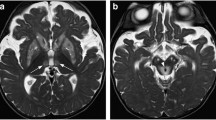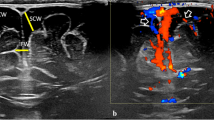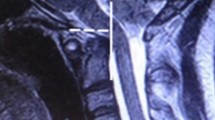Abstract
The posterior fossa syndrome (PFS) consists of transient cerebellar mutism, cognitive symptoms and neurobehavioural abnormalities that typically develop in children following posterior fossa tumour resection. Although PFS has been documented in more than 350 paediatric cases, reports of adult patients with a vascular aetiology are extremely rare. In addition, the pathophysiological substrate of the syndrome remains unclear. We report an adult patient with PFS after surgical evacuation of a cerebellar bleeding. After 45 days of (akinetic) mutism, the patient’s cognitive and behavioural profile closely resembled the “cerebellar cognitive–affective syndrome”. A quantified SPECT study showed perfusional deficits in the anatomoclinically suspected supratentorial areas, subserving language dynamics, executive functioning, spatial cognition and affective regulation. We hypothesize that cerebello-cerebral diaschisis might be an important pathophysiological mechanism underlying akinetic mutism, cognitive deficits and behavioural–affective changes in adult patients with PFS.


Similar content being viewed by others
References
De Smet HJ, Baillieux H, Catsman-Berrevoets C, De Deyn PP, Mariën P, Paquier PF. Postoperative motor speech production in children with the syndrome of ‘cerebellar’ mutism and subsequent dysarthria: a critical review. Eur J Paediatr Neurol. 2007;11:193–207.
Coplin WM, Kim DK, Kliot M, Bird TD. Mutism in an adult following hypertensive cerebellar hemorrhage: nosological discussion and illustrative case. Brain Lang. 1997;59:473–93.
Dunwoody GW, Alsagoff ZS, Yuan SY. Cerebellar mutism with subsequent dysarthria in an adult: case report. Br J Neurosurg. 1997;11:161–3.
Idiaquez J, Fadic R, Mathias CJ. Transient orthostatic hypertension after partial cerebellar resection. Clin Auton Res. 2011;21:57–9.
Schmahmann JD, Gardner R, MacMore J, Vangel MG. Development of a brief ataxia rating scale (BARS) based on a modified form of the ICARS. Mov Disord. 2009;24:1820–8.
Swinburn K, Porter G, Howard D. Comprehensive Aphasia Test. Hove: Psychology Press; 2004.
Visch-Brink E, De Smet HJ, Mariën P. Comprehensive Aphasia Test-NL. Amsterdam: Pearson Assessment and Information BV, in press.
Mariën P, Mampaey E, Vervaet A, Saerens J, De Deyn PP. Normative data for the Boston Naming Test in native Dutch-speaking Belgian elderly. Brain Lang. 1998;65:447–67.
Folstein MF, Folstein SE, McHugh PR. Mini-Mental State: a practical method for grading the cognitive state of patients for the clinician. J Psychiatr Res. 1975;12:189–98.
Wechsler D. Wechsler Adult Intelligence Scale-III (WAIS-III). London: The Psychological Corporation; 1997.
Randolph C. Repeatable Battery for the Assessment of Neuropsychological Status (RBANS). San Antonio: Psychological Corporation; 1998.
Heaton RK, Chelune GJ, Talley JL, Kay GG, Curtiss G. Wisconsin Card Sorting Test: revised and expanded. Lutz: Psychological Assessment Resources Inc.; 1993.
Dubois B, Slachevsky A, Litvan I, Pillon B. The FAB: a Frontal Assessment Battery at bedside. Neurology. 2000;55:1621–6.
Schmahmann JD, Sherman JC. The cerebellar cognitive affective syndrome. Brain. 1998;121:561–79.
De Smet HJ, Baillieux H, Wackenier P, De Praeter M, Engelborghs S, Paquier PF, et al. Long-term cognitive deficits following posterior fossa tumor resection: a neuropsychological and functional neuroimaging follow-up study. Neuropsychology. 2009;23:694–704.
Baillieux H, De Smet HJ, Dobbeleir A, Paquier PF, De Deyn PP, Mariën P. Cognitive and affective disturbances following focal cerebellar damage in adults: a neuropsychological and SPECT study. Cortex. 2010;46:869–79.
Mariën P, De Smet HJ, Paquier Ph, De Deyn PP, Verhoeven J. Cerebellar mutism. In: Manto M, Gruol DL, Schmahmann JD, Koibuchi N, Rossi F, editors. Handbook of the cerebellum and cerebellar disorders. New York: Springer; in press.
Baron JC, Bousser MG, Comar D, Soussaline F, Castaingne P. Noninvasive tomographic study of cerebral blood flow and oxygen metabolism in vivo. Potentials, limitations and clinical applications in cerebral ischemic disorders. Eur Neurol. 1981;20:273–84.
Mariën P, Engelborghs S, Fabbro F, De Deyn PP. The lateralized linguistic cerebellum: a review and new hypothesis. Brain Lang. 2001;79:580–600.
Miller NG, Reddick WE, Kocak M, Glass JO, Löbel U, Morris B, et al. Cerebellocerebral diaschisis is the likely mechanism of postsurgical posterior fossa syndrome in pediatric patients with midline cerebellar tumors. AJNR Am J Neuroradiol. 2010;31:288–94.
Crutchfield JS, Sawaya R, Meyers CA, Moore BD. Postoperative mutism in neurosurgery. Report of two cases. J Neurosurg. 1994;81:115–21.
Rostomily RC, Berger MS, Ojemann GA, Lettic E. Postoperative deficits and functional recovery following removal of tumours involving the dominant hemisphere supplementary motor area. J Neurosurg. 1991;71:62–8.
Gottwald B, Wilde B, Mihajlovic Z, Mehdorn HM. Evidence for distinct cognitive deficits after focal cerebellar lesions. J Neurol Neurosurg Psychiatry. 2004;75:1524–31.
Stoodley CJ, Schmahmann JD. Evidence for topographic organization in the cerebellum of motor control versus cognitive and affective processing. Cortex. 2010;46:831–44.
Lagrèze HL, Levine RL, Pedula KL, Nickles RJ, Sunderland JS, Rowe BR. Contralateral flow reduction in unilateral stroke: evidence for transhemispheric diaschisis. Stroke. 1987;18:882–6.
Andrews RJ. Transhemispheric diaschisis: a review and comment. Stroke. 1991;22:943–9.
Lane R, Krikbride V, Hughes P, Jones B, Costa D. Diagnosis of herpes simplex encephalitis by single photon emission tomography. Lancet. 1989;1:778–9.
Conti F, Manzoni T. The neurotransmitters and postsynaptic actions of callosally projecting neurons. Behav Brain Res. 1994;64:37–53.
Iglesias S, Marchal G, Rioux P, Beaudouin V, Hauttement AJ, de la Sayette V, et al. Do changes in oxygen metabolism in the unaffected cerebral hemisphere underlie early neurological recovery after stroke? A positron emission tomography study. Stroke. 1996;27:1192–9.
Van Harskamp NJ, Rudge P, Cipolotti L. Cognitive and social impairments in patients with superficial siderosis. Brain. 2005;128:1082–92.
Author information
Authors and Affiliations
Corresponding author
Rights and permissions
About this article
Cite this article
De Smet, H.J., Mariën, P. Posterior Fossa Syndrome in an Adult Patient Following Surgical Evacuation of an Intracerebellar Haematoma. Cerebellum 11, 587–592 (2012). https://doi.org/10.1007/s12311-011-0322-x
Published:
Issue Date:
DOI: https://doi.org/10.1007/s12311-011-0322-x




